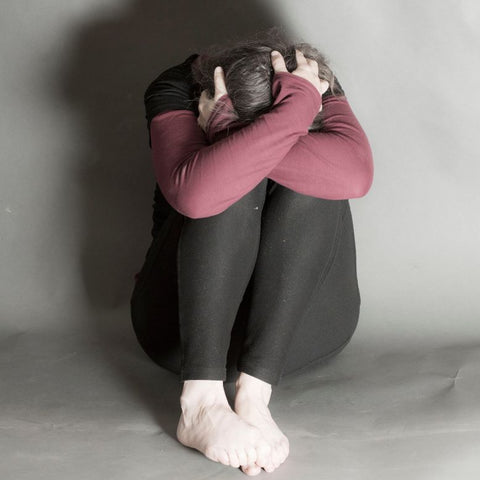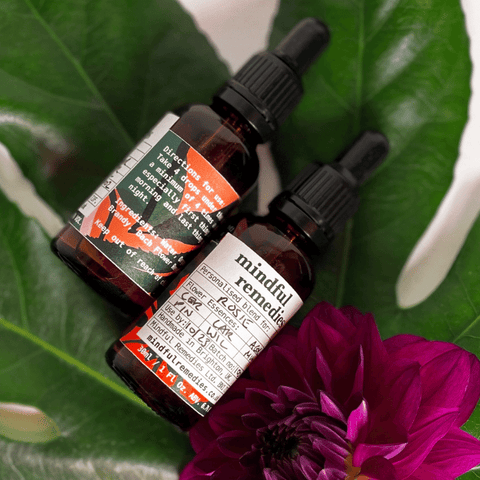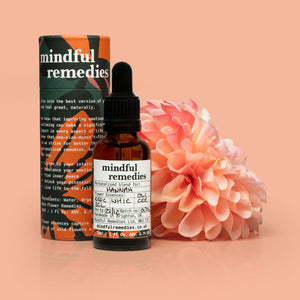your basket
- choosing a selection results in a full page refresh

Panic attacks can be incredibly distressing and can significantly affect your life. These sudden and intense episodes of fear and anxiety can happen without warning, leaving you feeling overwhelmed and out of control. The physical and emotional symptoms during a panic attack can be really tough, making it hard to manage daily activities and enjoy life.
In this blog post, we’ll look at panic attacks and explore a different approach to managing them: Bach flower remedies. While therapy and medication are common treatments, many people look for alternative methods to help with their symptoms. Bach flower remedies offer a natural, holistic option that some find helpful for emotional well-being.
We hope this post will give you a better understanding of this alternative approach and help you make informed choices about managing panic attacks.

Panic attacks are intense episodes of fear and anxiety that can manifest both physically and emotionally. They often occur without warning and can be a deeply unsettling experience for those who encounter them. Understanding the nature of panic attacks is crucial in order to effectively address and manage their symptoms.
A panic attack is a sudden surge of overwhelming fear or discomfort that reaches its peak within minutes. The experience is often described as a feeling of losing control or having a heart attack. Common symptoms of a panic attack include:
It's important to note that panic attacks cam have both mental and physical symptoms. You may experience a sense of impending doom, a detachment from reality, or a fear of having future panic attacks.
Panic attacks involve a complex interplay between physiological and psychological factors. Physiologically, panic attacks trigger the body's stress response, also known as the "fight-or-flight" response. This leads to the release of stress hormones, such as adrenaline, which prepare the body for a perceived threat. The surge of adrenaline can result in increased heart rate, rapid breathing, and other physical symptoms associated with panic attacks.
On a psychological level, panic attacks can stem from deep-rooted fears, traumatic experiences, or ongoing stress. They often arise from a combination of genetics and environmental triggers. Anxiety disorders, such as panic disorder or generalised anxiety disorder, can also increase the likelihood of experiencing panic attacks.

Panic attacks can be triggered by various factors, and each person may have different triggers.
Common causes and triggers include:
By learning about what panic attacks are, their characteristics, and what might cause them, you can start to understand these episodes better. This understanding helps pave the way for exploring different treatment options, including Bach flower remedies, which we'll cover more in this blog post.
When it comes to managing panic attacks, there are several conventional treatment options available. These approaches, which typically involve therapy and medication, have been widely used and researched. However, it's important to recognise that they may not work equally well for everyone, and some people may experience limitations or potential side effects.
Therapy: One common approach for treating panic attacks is cognitive-behavioural therapy (CBT). CBT focuses on changing negative thought patterns and behaviours that contribute to panic attacks. It helps people develop coping strategies, challenge irrational beliefs, and gradually face feared situations through exposure therapy. Other therapies, like psychodynamic therapy or relaxation techniques, can also be used to address underlying emotional issues.
Medication: For more severe or disruptive panic attacks, medications may be prescribed. Selective serotonin reuptake inhibitors (SSRIs) are often used to help regulate serotonin levels in the brain, while benzodiazepines can offer short-term relief from anxiety. While these medications can reduce the frequency and intensity of panic attacks, they may come with side effects and a risk of dependency.
While therapy and medication can be effective for managing panic attacks, there are some limitations and potential side effects to be aware of:
With the limitations and potential side effects of traditional treatments, many people look for alternative or complementary methods to manage panic attacks. In the following sections, we’ll explore Bach flower remedies as an alternative option. We’ll cover which remedies are known to help with panic attack symptoms and their specific benefits.
By considering these alternatives, you can broaden your treatment options and find an approach that suits your needs and preferences. Bach flower remedies can be a good choice for those who prefer natural methods or want to complement their existing therapy or medication. They don’t interact with other medications, making them a flexible addition to your treatment plan.
Do not take yourself off any existing medication you might be taking without first discussing with your doctor.

Bach flower remedies are a set of 38 natural essences derived from various flowers, plants, and trees. Each essence is associated with a specific emotional state or characteristic which may have tipped into a negative state. The flower remedies work by bringing your body back into equilibrium and reminding your body how to be. Dr Edward Bach, the creator of the flower remedy system, was a British physician and homeopath. He believed that the vibrational energy of these flowers could positively influence emotional imbalances and restore inner harmony.
Dr Bach believed that true healing could be achieved by addressing the underlying emotional causes of physical and mental ailments. He considered emotional wellbeing as a key factor in maintaining overall health and sought to develop a gentle and natural method to restore emotional balance.
Dr Bach's philosophy emphasised the importance of treating the individual as a whole, taking into account their unique emotional makeup rather than merely focusing on the symptoms. He believed that by harmonising emotions, the body's natural healing mechanisms would be stimulated, leading to improved wellbeing.
One of the appealing things about Bach flower remedies is that they are completely natural and holistic. The essences are prepared by infusing flowers in spring water and preserving them in a solution of brandy or glycerine. They contain no chemical additives and are considered safe for use by individuals of all ages, including children and pets. They are a safe and gentle way to manage emotional wellbeing without side effects.
In the next section, we’ll look at specific Bach flower remedies that can help manage panic attacks.
Here we explore some Bach flower remedies known to be effective for panic attacks, their properties, and how they can benefit individuals experiencing such symptoms.
At Mindful Remedies we offer the ability to craft your own personalised remedy, choosing up to 7 remedies in a bottle. If any of the remedies below resonate with you, simply click on the buttons below each description to add them to your treatment bottle.
The Rock Rose flower remedy is helpful for panic attacks marked by intense fear and terror. It’s especially suited for those who feel overwhelmed and in a state of crisis during these episodes. If you experience a sense of imminent danger or extreme fear or panic, Rock Rose can help you feel calm and de-escalate fears in your mind.
Taking Rock Rose can bring a sense of calm and resilience during these distressing moments. It helps you feel more grounded and in control, reducing the intensity and duration of panic attacks.

Mimulus is helpful for people who have panic attacks caused by specific fears or phobias. It helps address known anxieties and supports people in facing and overcoming them with confidence. If your panic attacks are triggered by situations like public speaking, flying, or social interactions, Mimulus can offer support by helping you face your fears and feel calm.
Taking Mimulus can boost your confidence and inner strength, helping to reduce the intensity of panic attacks. It brings a sense of calm and courage, making it easier to handle challenging situations and regain control.
White Chestnut Bach flower remedy is helpful for people who experience persistent, racing thoughts and an overactive mind. It's often recommended for people who struggle with repetitive or intrusive thoughts, which can increase anxiety and cause overthinking or catastrophising which only then fuels the cycle of panic.
Taking White Chestnut can help ease the mental chatter that worsens panic attacks. It helps bring clarity and calmness, allowing you to take control of racing thoughts and reducing the intensity of panic attacks.
These are just a few examples of Bach flower remedies that can be beneficial for panic attacks. It's important to remember that each individual is unique, and remedies should be selected based on their specific emotional state and needs. Often there may be underlying issues that come into play as well (such as past trauma) so it’s important to take a wider view. If you'd like to view descriptions for all 38 remedies, you can do so via the link below. Working with a qualified Bach flower practitioner can help determine the most appropriate remedies for individual circumstances.
view all 38 flower essences book an online consultation
In the next section, we will explore how to use Bach flower remedies and incorporate them into your life plus other strategies to support panic attacks that can be used alongside the remedies.

Follow these best practices to help you get the most out of the flower remedies:
If you would like to explore using Bach flower remedies as a treatment for panic attacks, you can do so through Mindful Remedies. You can choose to create your own remedy, self selecting up to seven remedies in a combination bottle which will then get posted to you wherever you are. Or alternatively, you can choose to book a consultation with Lucy Edwards who is a qualified Bach Flower Practitioner. She offers online consultations typically over Zoom and follows up your session by posting your remedy to you – again to anywhere in the world.
view all 38 flower essences book an online consultation
If you have any questions or would like to learn more, here are some helpful links:
Bach flower remedies are incredibly helpful for managing panic attacks, however you may wish to add some additional strategies to your routine. Here are some additional techniques you may wish to try in addition to help you manage panic attacks:
Mindfulness and Meditation: Practising mindfulness and meditation can help you stay calm and reduce anxiety. Regular mindfulness exercises or meditation sessions can help you stay grounded during panic episodes, letting you observe your thoughts and feelings and enhance your self-awareness.
Deep Breathing and Relaxation Techniques: Deep breathing exercises, like diaphragmatic breathing or box breathing, can help regulate your breathing and promote relaxation. These techniques are useful during a panic attack, calming your body and easing symptoms. Other relaxation methods, like progressive muscle relaxation or guided imagery can also help you manage panic attacks more effectively.
Regular Exercise: Getting regular physical activity can lower anxiety and improve your overall well-being. Choose an exercise you enjoy, whether it’s yoga, jogging, swimming, or dancing. Exercise releases endorphins, which can boost your mood and help manage stress.
Healthy Lifestyle Habits: A healthy lifestyle can positively affect your emotional well-being. Aim for good sleep, a balanced diet, and effective stress management. Prioritise activities that make you happy and relaxed, such as hobbies, spending time in nature, or connecting with friends or family.
Supportive Social Network: Having a supportive network of friends, family, or support groups can be helpful for managing panic attacks. Reach out to people who understand and encourage you during tough times. A strong support system can help reduce feelings of isolation and provide a sense of security.
Cognitive-Behavioural Techniques: Techniques from cognitive-behavioural therapy (CBT), like identifying and challenging negative thoughts or practising positive affirmations, can help change your mindset and reduce anxiety. Working with a CBT therapist can give you valuable tools for managing panic attacks and addressing underlying issues.
Combining these strategies with Bach flower remedies can create a well-rounded approach to managing panic attacks and improving your overall emotional well-being.

Since 2021, Lucy Edwards, a qualified Bach Flower Practitioner and the driving force behind Mindful Remedies, has connected with clients across the world. Crafting thousands of personalised remedies, Lucy has supported individuals' emotional wellbeing, shipping remedies to far-flung places like the USA, Thailand, and Australia.
Lucy is readily available for conversations, offering personalised advice to guide you on the path to holistic wellness. It's important to note that she's not only qualified but also registered with the Bach Centre, ensuring that every consultation and remedy adheres to Dr Bach’s original guidelines for expert care and efficacy.
Exclusive pricing 20% off your first subscription order and 5% off all future orders
VIP treatment Receive personalised advice from Lucy, free gifts & 15% off gift vouchers
Easy to manage Edit remedy, change schedule, pause or cancel at any time
Exclusive online workshops Access to workshops focusing on emotional wellbeing, guided by Lucy
Early access to new products Be the first to try out new remedies or wellness products, before anyone else



